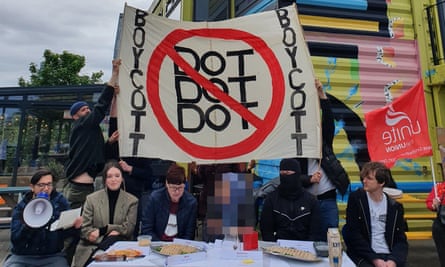Firms that house residents in buildings that would otherwise sit empty have been accused of raising costs during the cost of living crisis, with one company reportedly increasing some fees by more than 100%.
It means property guardians – those who live in empty buildings such as ex-factories, offices, care homes and condemned housing – are facing steep increases. Some fear being made homeless.
They pay less than the market rent but the trade-off is that they have fewer rights and, often, worse living conditions.
Property guardian companies act as the middleman between owners and those seeking cheap accommodation, and are used by councils and housing associations to provide affordable homes.
Residents sign licences offering fewer protections than a tenancy agreement, and pay a monthly licence fee rather than rent. They must agree to vacate the property with only 28 days’ notice, and no warning needs to be given before an inspection of their home.
Campaigners say that some people living in properties leased out by the property guardian company Dot Dot Dot have been hit with fee increases of up to 113%.
The company describes itself as an ethical property guardian company, and tenants (or “licensees”) have to complete 16 hours of volunteer work a month as part of their licence agreement.
However, residents at its site in Abbey Wood, south-east London, say they were told in January that they had six weeks to agree to the increases.
London Renters Union, along with some of the guardians, are challenging the rises and calling for a boycott of the company.
 View image in fullscreenProtesters call on the public to boycott Dot Dot Dot. Photograph: London Renters Union
View image in fullscreenProtesters call on the public to boycott Dot Dot Dot. Photograph: London Renters Union
One Abbey Wood resident, who has been a property guardian for six years, said she asked Dot Dot Dot for more time to sign the new agreement as she was struggling with health conditions, and needed to think about whether she could afford to pay £425 a month extra. The amount has since been reduced to an additional £230.
She said she was issued with a notice to quit – the equivalent of an eviction notice – in April, and has been threatened with legal action unless she moves out by November, despite agreeing to sign the new contract and begin paying the increased fee.
She said: “I went into shock – I was absolutely impacted, and it made me really unwell.
“I’ve always paid my fees, I’ve always done my volunteering, I’ve been a guardian for six-plus years.
“I don’t know what I’m going to do if they move me out – I’ve got nowhere to go. I’m going to be homeless.”
A Dot Dot Dot spokesperson denied that guardians who agreed to the licence fee increase after the deadline were at risk of homelessness but confirmed it is taking legal action against some residents.
“Guardians who agreed to the fee changes after our deadline are not subject to legal proceedings. They continue to be housed by us,” the spokesperson said.
“In a small number of cases, we are taking legal action against property guardians who have refused to abide by the terms of their guardianship. We can’t comment on individual cases for confidentiality reasons.”
The company said it paused the licence fee review in 2020 because of the coronavirus pandemic, before resuming the plans in 2022.
“This is partly for our own financial sustainability as a business, and partly because we need to bring older, lower fees in line with newer ones so guardians are paying similar fees for similar properties,” Dot Dot Dot said.
It said guardians were initially given six weeks’ notice of the changes, which was extended to 10 weeks, and most accepted the increase. Under Dot Dot Dot’s previous structure, fees ranged between £185 and £860 a month. This has risen to between £325 and £895, including council tax and utilities.
Private rents have also soared, making it harder for property guardians to rejoin the mainstream rental market. The latest Zoopla data issued this month shows a 12.3% average annual increase, with typical London rents up 17.8%.
This is pushing some tenants towards property guardianship as they seek cheaper options, and housing campaigners say that this rise in demand is partly to blame for the licence fee rises.
The Property Guardian Providers Association (PGPA) expects the number of people applying to be guardians to reach 50,000 this year, up from about 30,000 in 2021.
Robert Taylor, an organiser at Camden Federation of Private Tenants in London, claims that some of these firms see the cost of living crisis “not as a very difficult time to help and support people but as an opportunity to squeeze yet more out of them, knowing full well that if they don’t like it, there are plenty more out there who will pay it, because they are so desperate to put a roof over their heads”.
Graham Sievers, the chair of the PGPA, which represents three guardian firms (not including Dot Dot Dot), said most licence fees include utility bills, meaning prices have increased to reflect the huge increases in energy costs.
However, the Guardian has seen evidence of another firm raising fees by more than £100 a month where tenants have to cover their own gas and electricity. Dot Dot Dot guardians in Abbey Wood also pay for their own utility bills.
Sievers also blames rises across the sector on the increased cost of maintenance and repairs.
“Licence fees have risen – some would say narrowing the gap with the private rental sector, but I disagree,” Sievers said.
He accepts there has been “some bad publicity on licence fee increases” but said: “I did a quick check through available guardian properties today, and I can still see significant savings for this type of accommodation.”
“The PGPA does not set, or recommend, fee levels within the association but we do insist on good communications between member companies and their guardians, to give plenty of notice and reason for any increases,” he adds.
However, Al Mcclenahan, at the group Justice For Tenants, said: “The cost of living crisis means many of the poorest in our society simply can’t afford basic shelter.
“This increases the demand for cheaper places to live. The increase in demand means guardianship companies can increase their prices and make more money.
“It’s hard to see what reason a guardianship company could have for increasing prices above the inflation rate, other than to make more money.”
This article was amended on 26 September 2022 to clarify that property guardians are referred to in the sector as “licensees”.




Leave a Reply
You must be logged in to post a comment.